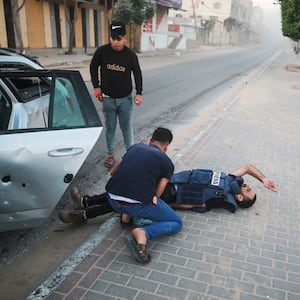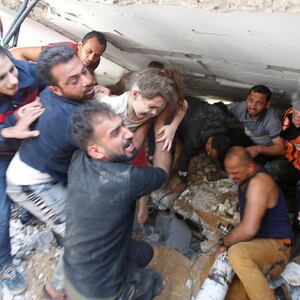When word reached him in Boston that his mentor’s home had been hit during an Israeli airstrike in Gaza early Sunday, Dr. Osaid Alser joined an online vigil.
“We could only pray for his survival,” Alser later told The Daily Beast.
He prayed and waited as recovery workers dug through the rubble of the apartment building where Dr. Ayman Abu al-Ouf and his family had chosen to live because it was near the biggest hospital in Gaza, where he served as both head of internal medicine and chief of the COVID-19 ICU.
Alser and many young doctors who trained under al-Ouf revere him as an uncommonly dedicated physician whose singular concern was caring for his patients.
“Taking care of patients during a pandemic, during a war, I don’t know if ‘hero’ is enough for him,” Alser told The Daily Beast. “He focused on taking care of patients and that’s it.”
Alser is a 29-year-old research fellow at Massachusetts General Hospital and Harvard Medical School who also studied at Oxford University. But he learned how to be a doctor in the fullest sense as an intern at Al-Shifa Hospital while assigned to the man whose fate he waited to learn from 5,400 miles away.
Hope for al-Ouf faded as three hours of searching became four.
“Somebody posted they are still trying to remove his body from under the rubble,” Alser said.
Multiple reports online confirmed that 50-year-old al-Ouf, who was born and raised in Gaza, had been killed along with his wife and parents and two children—a 12-year-old daughter, Tala, and 16-year-old son, Tawfiq. A third child was critically injured.
A photo then appeared on Twitter of al-Ouf’s final visit to the hospital where he had given the very best care he could when 40 percent of the essential medicines are out of stock and the COVID-19 positivity rate for the area is 35 percent. He lay wrapped in an off-white shroud on a gurney outside the emergency entrance as the Al-Shifa staff stood with bowed heads and scrubs and white coats, saying a funeral prayer.
The same grief Alser felt was clearly inscribed on the brows above the masks those in Gaza all wore as protection against the virus as they mourned this heart-wrenching casualty of war. His thoughts and feelings were echoed by a fellow young doctor on Facebook.
“I have never and will never in my life see a doctor more humble or more dedicated than Dr. Ayman Abu al-Ouf, and I bear witness that I begged you, Ayman, to leave the hospital and go home to rest or eat hundreds of times,” Dr. Gaeth Zaanin later said in a Facebook post.
As all his protégés knew, al-Ouf lived where he did so he could more easily visit his patients at 6 a.m. each day and stay on into the night to pass on a bit more knowledge to his medical students. He once confided to Alser that he worked for a much lower salary than he could have earned in private practice. He was not paid at all on those occasions when the hospital was unable to meet its payroll.
Al-Ouf would have already checked on his patients himself before taking Alser and the other interns on their morning rounds. He stressed to the interns the importance of being forthcoming with those in your care.
“He basically says you have to explain to the patient everything, you should not hide anything,” Alser told The Daily Beast.
Alser recalled that al-Ouf could be “a bit harsh” when pressing students to take detailed histories from patients and ask questions they might have felt too intrusive. He explained to the students that it was imperative to gather anything that can lead to an accurate diagnosis. He taught them to then offer this same explanation to the patients.
“At the end, we explain why we ask these questions,” Alser said, citing his mentor’s method.
By his own unflagging example, al-Ouf taught his students to keep themselves up to date on the latest developments in medicine and standards of care in America and Europe. He also kept himself apprised of what to do if the best was not available, as was too often the case in Gaza. There remained one guiding principle.
“Give the best possible medical care,” Alser said.
That was al-Ouf’s sole focus.
“He was apolitical,” Alser said. “[That is] very rare in Gaza.”
When Alser contemplated educational opportunities that were available to him away from Gaza in 2017, al-Ouf counseled him to take them—and come back.
“Return to teach, not to learn,” Alser said.
That journey had taken Alser to Harvard Medical School, where he was when he heard about the Israeli airstrike on al-Ouf’s building. Alser and also learned that another doctor, 66-year-old psychiatric neurologist Dr. Mooein Ahmad al-Aloul, had been killed in a different raid on a different building that day. The home of one of Alser’s medical school classmates had also been bombed; the classmate had survived, but his entire family had perished.
Then via Twitter came the photo of the body on a gurney outside the hospital as the staff offered a solemn prayer. The total number of Palestinians killed had risen to nearly 200 during the weeklong conflict, which has also left 10 Israelis dead.
As the double horror of war during a pandemic raged on, al-Ouf leaves a legacy of devotion and selflessness and decency that makes him for the rest of us what he has been for his students.
“He’s a role model,” Alser said.



